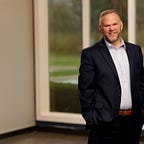The Interview: Don Wettrick
Editor’s Note: Don Wettrick is the founder of StartEdUp Innovation in Indianapolis, Indiana, and also serves as the innovation coordinator at Noblesville High School in Noblesville, Indiana. See what he and his students are doing in the Innovation and Open Source Learning Class go to their Facebook page. They are doing daily videos to let people outside their classroom see what is going on and learn how to collaborate with them. Don also wrote a book about innovation and education titled Pure Genius: Building A Culture of Collaboration and Taking 20% Time to the Next Level. See an in-depth interview about what he and his students do here. This interview originally appeared in the August issue of the 1635 newsletter. SUBSCRIBE TO RECEIVE IT MONTHLY.
1. My experience in my public school was…
Awkward. My dad was a teacher and my sister was an “A” student so the expectations on me were high. But, I was the kid who questioned everything, the kid that asked aloud “when will I use this in real life.” But, at the same time, I appreciated and supported my teachers. Because my dad was an educator, I could relate to them, often times talking to them about their frustrations (which led me to be voted most likely to never live down the term “teacher’s pet” in the senior edition of the last newspaper). However, that is also how I got by in high school- my charm (or “brown nosing”), and if I needed extra help from the teachers, they would happily give me the help I needed.
2. When I think of public education, I…
…think it’s worth saving. I’m a public school teacher that wants “the system” to transform, thus I started the “Innovation and Open Source Learning Class.” I still think that some of our time is well-spent in school. Students cannot be “innovative” unless they can read, write, question, form hypothesis, and understand our history. BUT I want more schools to specifically set aside time in the day for our students to CREATE over just consumption. I want students to have an opportunity to fail and then reflect on that failure as a means to adjust and adapt (aka the “pivot” Silicon-ish terms).
3. If I were telling the story of public education…
I would include the WHY we do what we do. The “invention” of school was designed to get people assembled in a setting where they would “learn” how to become workers for the industrial age. The second “act” of my story is to understand that education fulfilled a great purpose, but layout how the world has changed, and examine what skills are needed in the next ten years… and how we can build around that.
4. One of your latest initiatives is to change education through the principles of startup culture and entrepreneurship. What inspired this and what has been your experiences interviewing the likes of Gary Vee and Tucker Max as part of this effort?
I started a podcast because many of my “heroes” of innovation and entrepreneurship are relatively unknown in the education circles. People like Tim Ferris, Javeen Jain, Daniel Pink, Tina Seelig, and Seth Godin all keep pushing a message that goes against the grain of what we teach in school, AND they have a pretty high success rate. In my interviews with entrepreneurs and authors, I have found again and again that it’s the cliché “fail early and fail often” theme that resonates with them. The entrepreneur wants to learn fast, take (calculated) risks, and adapt- while “good students” want to NEVER fail, take zero risks, and fit in because they fear an “F.” I quickly found that many of these entrepreneurs had strong opinions about education, and would get back with me if I asked them questions. One day our class interviewed Tim Ferris for almost two hours, and after recording it for my students that couldn’t make it down to my room I thought, “I really should put out a podcast.” I started recording the next day.
5. In your opinion, what are the greatest rewards of taking risks and pushing the envelope in education?
The greatest rewards in takings risks are that you learn that you lived. Nothing bad really happened. Some people may laugh, but my students quickly realize that while you may “stand out” for doing something that went wrong- the “standing out” is what people eventually admire. Many people make fun of the risk- taker until he/she succeeds, then we call them “visionary.”
1635 is a newsletter and a monthly moment to propel us forward in public education. Each month it features long-form content from those working both inside public education and from those on the outside looking in. We can learn so much from both viewpoints. The newsletter delivers the last Tuesday of every month. Subscribe.
